There is a huge variety of e-commerce platform packages from which to choose, so building an online store has never been easier.
To begin, first you'll need ecommerce web hosting, which is to say hosting that will scale up with your business without interruption. Next you'll need shopping cart software to run with your ecommerce site. This will probably include a payment gateway for credit card processing, though if you're already established and have a decent enough credit rating you could apply for merchant services to reduce transaction costs.
Your ecommerce website doesn't have to be expensive to design, either, as there are plenty of ecommerce themes available. Additionally, if you also have a bricks-and-mortar store than a Point of Sale (POS) system for mobile credit card processing can be particularly desirable.
Which e-commerce software is best for your business depends entirely on your specific requirements. If you're an online-only outfit, then POS integration won't be necessary, but you may get a lot of business from overseas, in which case foreign currency support would be a requirement.
In this article, we’re going to highlight some of the best e-commerce platforms available right now, before moving on to consider other options you might want to explore in terms of creating your own e-commerce solution.

Wix is our top-rated website builder
If you want a simpler alternative to some of the full-on web store building solutions here, check out Wix. It’s highly user-friendly, yet there’s still plenty of e-commerce power available to create a suitably impressive online store.
Wix’s e-commerce plan starts from £11 per month
- We've also featured the best tax software.
The best e-commerce platforms - at a glance
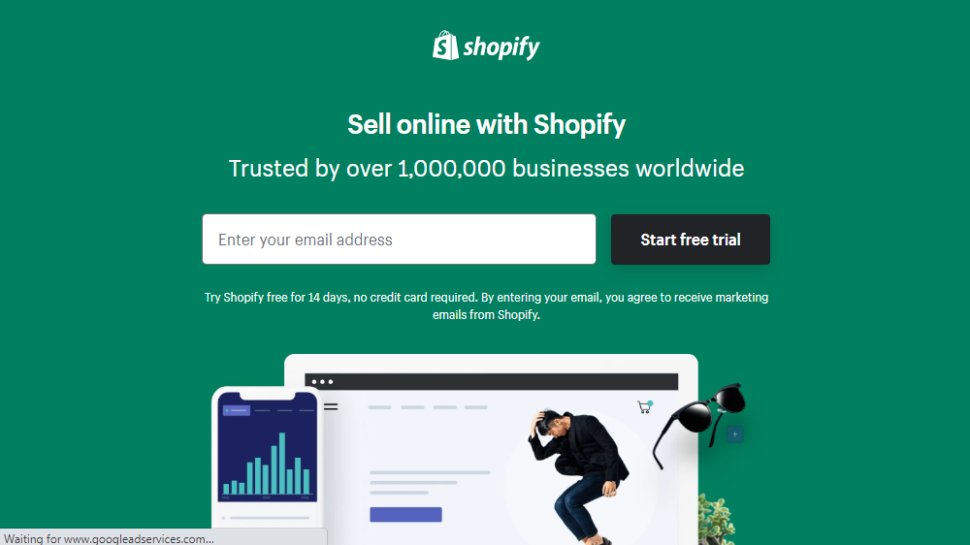
1. Shopify
Giant of the e-commerce world
Shopify is perhaps the most well known e-commerce platform available. It was set up in 2006 by founders Tobias Lütke, Daniel Weinand and Scott Lake who, as the story goes, felt that there wasn't a simple-to-use e-commerce platform available and so built their own. The company claims that: "You don't need to have any technical or design experience to easily create a beautiful online store."
According to Shopify, it's possible to get one of its online stores up-and-running within minutes. Users can choose from a wide range of templates, or they can design the look and feel of their store themselves. It accepts a comprehensive range of credit cards, has Level 1 PCI compliance and 256-bit SSL encryption for security, and it offers 24/7 support via phone, instant messaging or email.
The platform provides a full CMS with which users can manage the functionality and layout of their online store. Users can manage their store on-the-go using Shopify's mobile apps, and the platform itself is fully responsive, meaning the store will be optimized for visitors regardless of whether they access it from a desktop computer or a mobile device. Also, a live chat function is available which allows you to have a real time conversation with your customers. There's a built-in support for 3D models and video too. There's also an option to create customizable storefronts on Facebook and Instagram. Until October 1, 2020, you can now craft email campaigns tailored to your brand with Shopify Email, for free.
Shopify also offers users unlimited hosting for their stores, in-depth analytics of how visitors are using the store, and functionality for marketing such as SEO optimization, a discount and coupon engine, gift cards and email marketing tools. You can test out Shopify with a 14-day free trial.


2. Bigcommerce
E-commerce expertise with a fully-fledged CMS
Bigcommerce was established in 2009 and promises to "support your business, not just your store." In addition to offering support via phone, instant chat and email, it also offers articles and videos to help with e-commerce, and access to a team of e-commerce experts who can provide advice and guidance about online selling. Their experts are qualified in both Google Analytics and Adwords.
Like Shopify, Bigcommerce provides a variety of templates and themes to help stores look their best and get up-and-running quickly. Alternatively, users can design their own store or use Bigcommerce designers to do so. The platform incorporates a full-featured CMS that allows users to run an entire website, rather than just a store.
Users can benefit from detailed and flexible product management, optimized search engine rankings, along with a variety of integrated marketing tools and analytics. Payments can be accepted via 40+ pre-integrated gateways and shipping details can be customized as per the business's requirements. As of late, some new features have been added like support for Amazon Import and Link and Shopping in Instagram Stories. The platform offers automated order processing, flexible tax rules depending on where orders are made and shipped, and support for multiple currencies. You can test out Bigcommerce with a 15-day free trial.

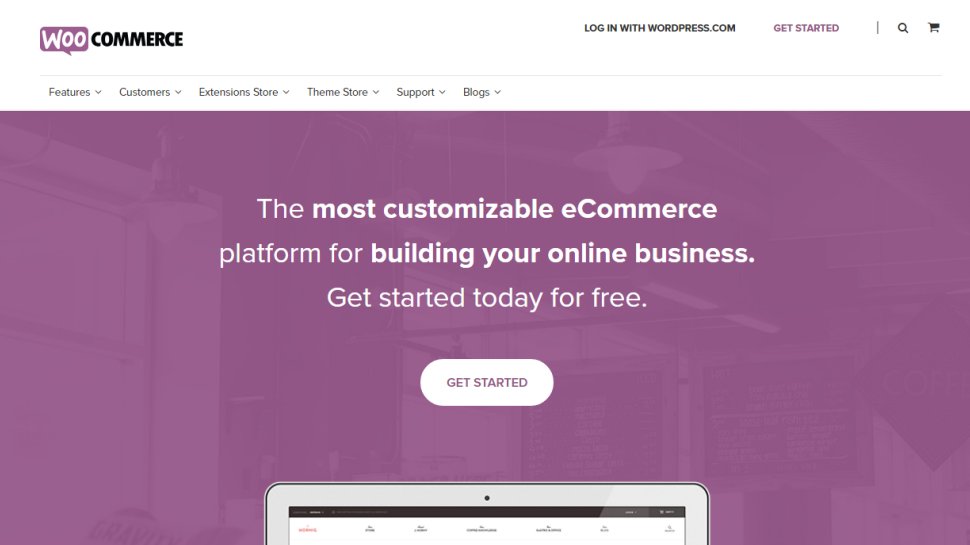
3. WooCommerce
The Wordpress ecommerce solution
Rather than being a standalone ecommerce platform, WooCommerce is a free plugin that can turn your Wordpress website into a fully functional ecommerce website.
The basic WooCommerce plugin is easy to install through Wordpress, and even better is that the plugin is free to download and use.
However, to get the most from WooCommerce you will need to install a number of third-party plugins. This is to add features such as payment processing, inventory management, and stock control.
Major third-parties are supported, and you can take payments from a range of options, such as Paypal, Sagepay, and Stripe. There are also plugins for a number of integrations, such as for Mailchimp for email marketing and Xero for accounting.
The ability to choose your own plugins means you can customize your ecommerce website exactly to your needs. although most addons have a cost they are relatively cheap, with each tending to cost a few dozen dollars. The result is the ability to build your own fully-functioning ecommerce website quickly, easily, and at a fraction of the cost of other ecommerce platforms.
All in all this makes Woocommerce one of the best contenders for those looking to ease themselves into starting an online retail business, whether for physical products or even digital ones.

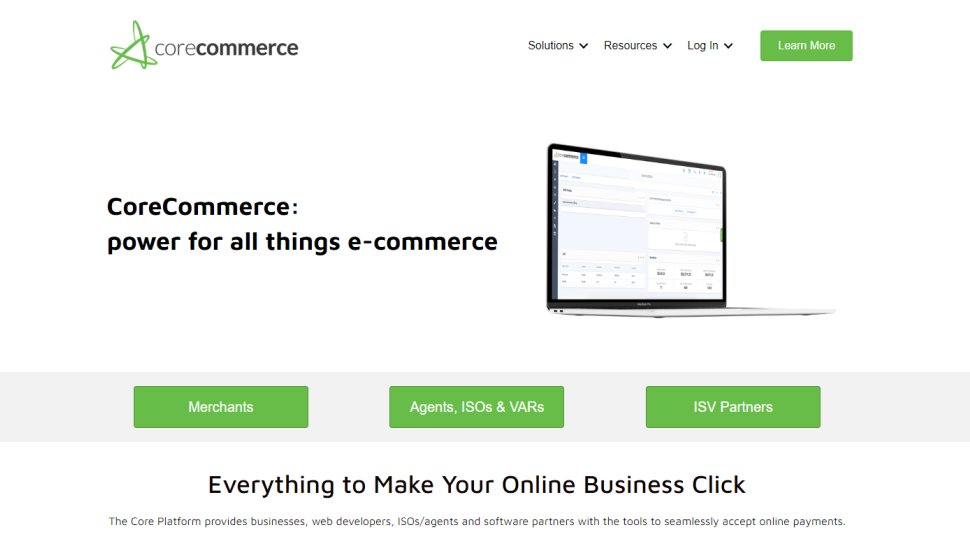
4. CoreCommerce
Service which focuses on SMBs
CoreCommerce was set up in 2001 and focuses on providing e-commerce services to small and medium-sized businesses. The company places an emphasis on simplicity and transparency, promising that its platform is easy-to-use and that customers will not fall foul of any hidden charges.
Perhaps CoreCommerce's most unique aspect is that all of its features are offered to all customers regardless of what plan they are on. Price plans are determined by the number of products, the number of email addresses, the amount of bandwidth and the amount of storage required by the user (and higher-end plans also benefit from additional support).
As with other e-commerce providers, CoreCommerce offers functionality for store design, product management, order processing and marketing. Of its headline features, the platform offers unlimited product customization options, a built-in blogging engine, and secure hosting that is provided by Rackspace and comes with a 99.9% uptime guarantee. You can try CoreCommerce out with a 15-day free trial.

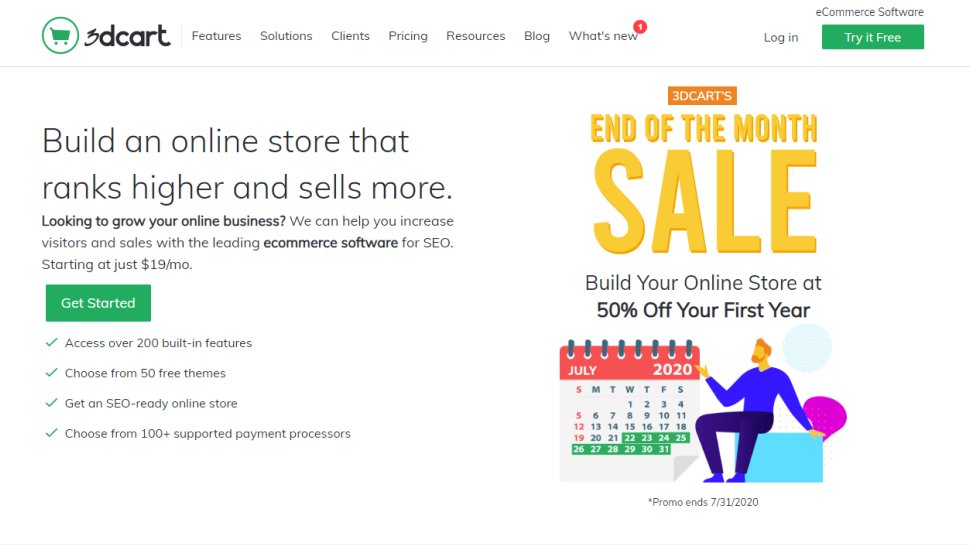
5. 3dcart
Allows for an impressive degree of tailoring to your needs
Having been founded in 1997, 3dcart is the oldest of our featured providers here. It was set up with a view to incorporating as many of the most requested e-commerce features into one platform as possible.
The company says it has six core values by which it operates: ongoing innovation, good service, simple solutions, fostering trust, keeping employees and customers happy, and stimulating prosperity amongst employees and customers.
Some of the platform's innovative features include a module that users can install to offer gift-wrapping, a purchase order system, the option of running a loyalty program and the ability to offer recurring orders. Many of these features are very specific, meaning that stores can be highly tailored to the needs of each business.
Stores can be designed using one of the many templates offered by 3dcart, or users can design their own store. A quick edit bar means that making changes to the design of a store is simple. Product images are fore-fronted with 3dcart's auto-zoom feature and products can be sold via Facebook with its store integration. As with some other platforms, users can blog directly from 3dcart and tools are provided for setting up coupons, sending newsletters and affiliate marketing. 3dcart is regularly updated and new features are constantly added, like the drag and drop HTML builder, the home page editor or scheduled promotions. Users can also make use out of "make an offer" feature, which basically lets you and your customers to negotiate on a price. There is also a B2B quote system, which provides customers with a temporary quoted price after discussing their order via phone.
In addition to its platform, 3dcart offers a number of professional services. Users can request help with SEO, PPC, shopping feed management, social media, Facebook ads and conversion consulting. Help can also be provided to ensure that a user's store is set up to the highest standard. Services such as site cloning, setting up custom tracking, data migration and training are offered.
In addition, 3dcart can provide SSL certification. Hosting is guaranteed at 99.9% uptime and 24/7 support is provided via phone, email or online chat. You can test out the service with a 15-day free trial.

Also consider:
Alternative means
If you don’t want to go the route of using an off-the-shelf package, what other options are available for you to explore? That’s what we’re going to look at in the second half of this piece…
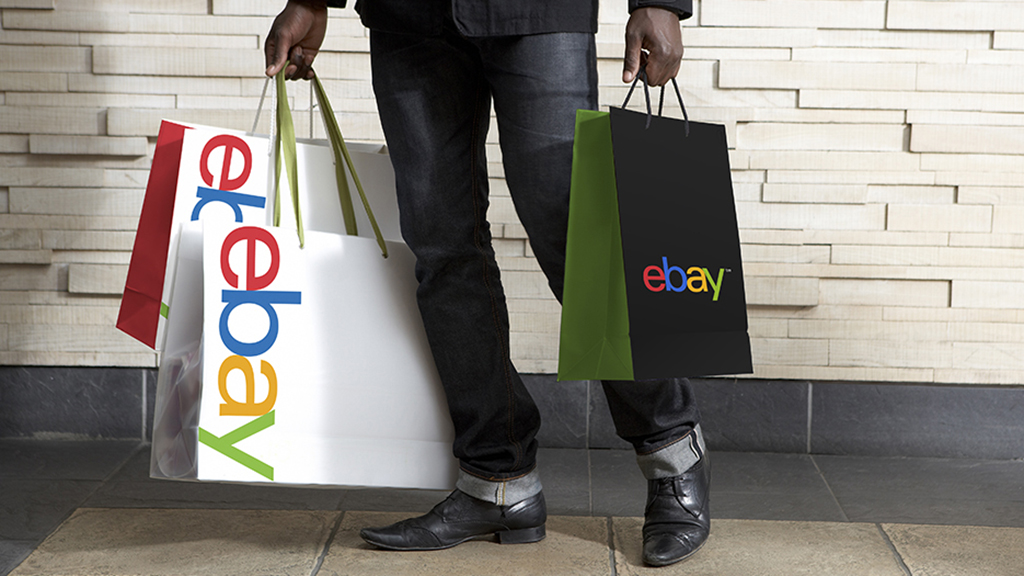
Is eBay right for your business?
Opening its doors in 1999, eBay UK now has over 14 million users, with over 10,000 people using the site for a business that is their primary means of income. It's not just about people selling unwanted goods - businesses have used the simplicity that eBay offers to set up lucrative operations. Even the larger brands such as Argos, Debenhams and House of Fraser are using eBay to sell online.
With sophisticated tools now available you can be up and running with your store in just a few hours. The eBay Seller Centre has all the information you need. Each store is managed via eBay's familiar user interface, and there are a number of eBay-provided tools to help manage, track and promote your shop once it's established.
Using eBay as the platform for your business could be ideal if your business wants to sell goods on a fixed price basis. The complete integration of the PayPal e-payments system into eBay takes care of this essential component of your store.
The key with eBay is to look closely at the costs involved and also the transaction fees that PayPal charge before moving forward and setting up your own store.
How to create your own e-commerce solution
Of course if you want complete control over every aspect of your new online store, building each page yourself will be the best course of action. Hiring someone to code your website is one option. If you decide to do this follow these steps:
- Ask the company for live examples of their work to look at
- Write a detailed brief of the site you want created. The more detail the better to avoid confusion
- Ensure you understand the price you are being charged and how many revisions this price includes
- Always have a signed agreement or contract before work commences
- Ask whether the designers will host your site and if you will be able to make updates yourself or if all updates must go through the design agency at an additional cost
- Ask for the copyright of your design to be assigned to your company, as your website is an important part of your business' intellectual property
- Put into your contract, details of how the agreement can be amicably dissolved if things go wrong
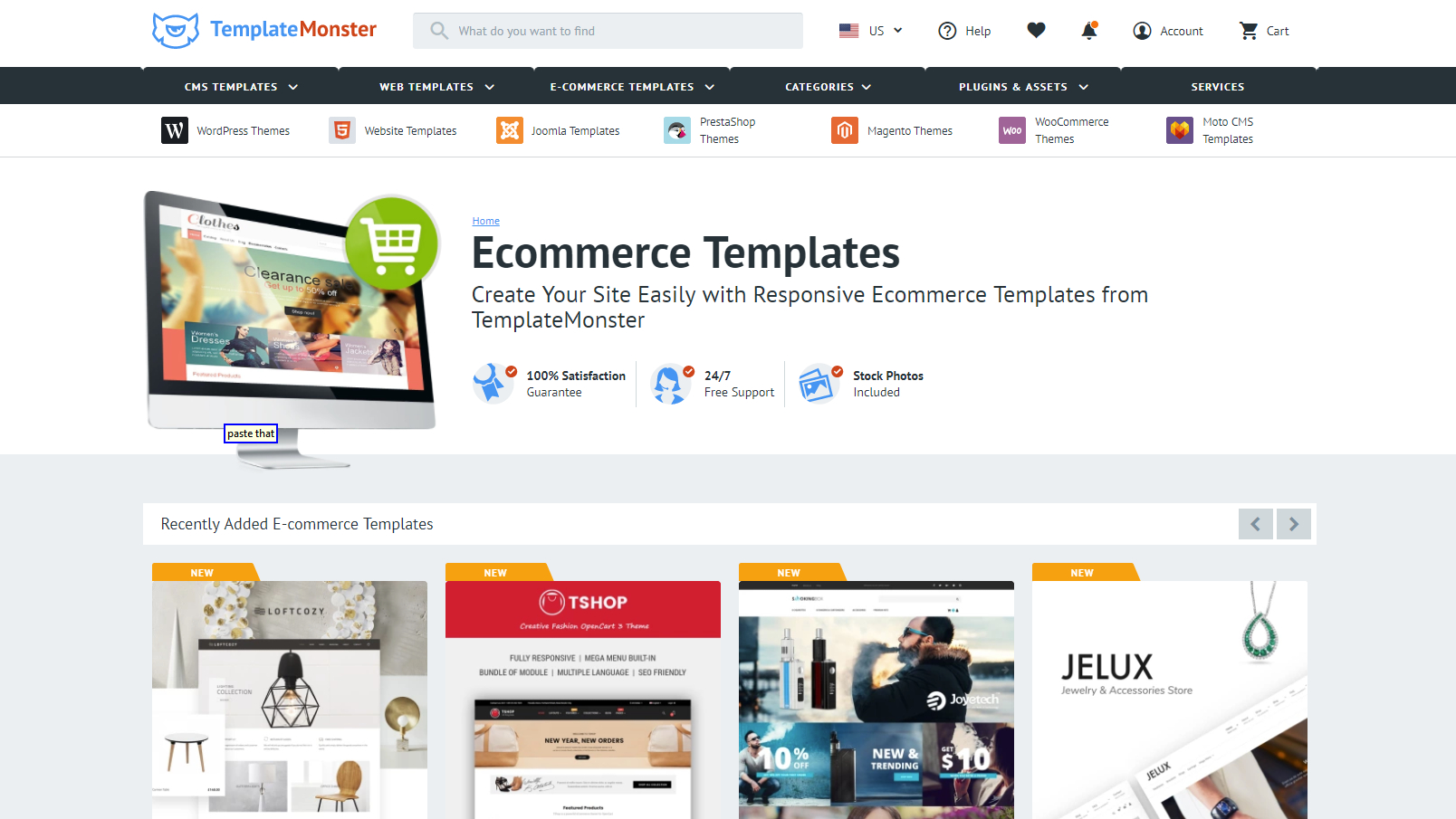
You also don't have to build your site completely from scratch. Buying a template can give you all the basic pages your site needs. You can then either modify them yourself using an application like Dreamweaver, or hire a coding expert to make the changes. Website templates are available from a number of vendors including Template Monster.
If you already have a website and want to add e-commerce functionality, this can be easily achieved with a number of applications including:
Final advice
Whichever route you decide to take when building your website always remember:
- You need to ensure your store can be easily updated and managed.
- Good professional web hosting is vital to ensure your site is always available.
- Look for payment and shopping carts that are intuitive and efficient to use.
- Customer service is king these days. Businesses shouldn't just efficiently take customers' money, but should also properly support them.
- Make sure that your store is fully integrated with all the leading social media sites.
- Put security first – shoppers are now more comfortable buying online, but always ensure your site uses SSL (Secure Socket Layer) which is now the industry standard for online payments.
- Above every other consideration should be your site's visitor experience. Don't forget your competitors are just a mouse click away in the world of e-commerce.
Setting up your online store should be approached carefully and diligently to ensure you put a professional and efficient site live. Internet shopping continues to expand. Make sure your business doesn't miss out on a sales channel that shows no signs of slowing down.
- We’ve also picked out the best website builders and the best website hosting services
from TechRadar - All the latest technology news https://ift.tt/3eVucYv


